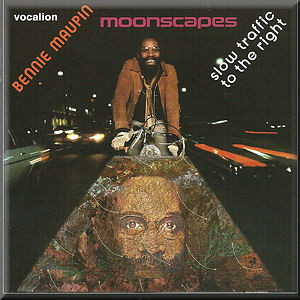Slow Traffic to the Right
1. It Remains to be Seen
2. Eternal Flame
3. Water Torture
4. You Know the Deal
5. Lament
6. Quasar
Bennie Maupin - Soprano sax, tenor sax, saxello, piccolo, flute/alto flute, bass clarinet, Oberheim polyphonic synthesizer, background vocals
Patrice Rushen - Acoustic piano, Fender Rhodes electric piano, clavinet (tracks 1-4, 6)
Onaje Allan Gumbs - Acoustic piano (track 5)
Patrick Gleeson - Oberheim and E-Mu polyphonic synthesizers (track 5)
Ralphe Armstrong - Gibson G3 bass guitar (track 5)
Paul Jackson - Custom bass guitar (tracks 1, 2)
James Levi - Drums (tracks 1, 2)
Blackbird McKnight - Electric guitar (tracks 1, 2)
Eddie Henderson - Trumpet, flugelhorn (tracks 1, 2)
Craig Kilby - Trombone (tracks 1, 2)
Nathan Rubin - Concertmaster, strings (tracks 1, 2)
Moonscapes
7.
Nightwatch
8. Farewell to Rahsaan
9. Anua
10. A Promise Kept
11. Just Give It Some Time
12. Sansho Shima
13. Crystals
Bennie Maupin - Soprano sax, tenor sax, flute, bass clarinet, Eu synthesizer, Computone synthesizer wind-driver, bass marimba, glockenspiel
Bobby Lyle - Acoustic piano, Fender Rhodes electric piano, clavinet (tracks 7-10, 13)
Onaje Allen Gumbs - Fender Rhodes electric piano (tracks 11, 12)
Patrick Gleeson - Synthesizer programming (tracks 11-13)
Abraham Laboriel - Bass guitar (tracks 11, 12)
Mingo Lewis - Congas, percussion (tracks 11, 12)
Harvey Mason - Drums (tracks 11, 12)
Mike Sembello - Acoustic/electric guitar (tracks 11, 12)
Beverly Bellows - Harp (track 8)
Derrick Youman - Vocal colours (track 10)
This CD contains the tracks from two LPs, originally released in 1977 and 1978 respectively. Their rarity can be gauged from the fact that an interview with Bennie Maupin notes that a used vinyl copy of Slow Traffic to the Right is on offer on eBay for $175! Maupin seems a half-forgotten name these days, although he was well-known in the 1970s as a member of groups led by Miles Davis and Herbie Hancock. Certainly this album reminds me of the heyday of jazz-rock, especially the new directions that Herbie Hancock took the music in his Mwandishi and Headhunters albums. Bennie Maupin was a multi-instrumentalist whose talents were perfectly suited to the eclectic styles of the Hancock and Davis groups.
The two albums on this CD adopt the same multi-directional approach and the personnels include some of the leading musicians on the 1970s' jazz-fusion scene, such as Patrice Rushen, Abe Laboriel and Harvey Mason. For a while there was a widespread belief that jazz-fusion had had its day but this reissue - skilfully remastered by Michael J. Dutton - suggests that the music still has an audience, which includes me. The rhythmic strength of this music makes a valuable antidote to the dreamy meanderings that seem so widespread in certain currently fashionable areas of jazz.
Slow Traffic to the Right includess four compositioons by Bennie, such as Water Torture and Quasar, which first came to people's notice occupying one side of Herbie Hancock's 1972 album Crossings. The former has a repetitive theme over which Bennie solos swirlingly on tenor sax and Patrice Rushen solos lyrically on Fender Rhodes. The performance is given depth with strings subtly arranged by Onaje Allan Gumbs. The latter also has strings supplied by Gumbs (by gum!) and bassist Ralphe Armstrong underlines the unusual 7/4 beat. Eddie Henderson adds a declamatory solo on the flugelhorn.
Other highlights of this first LP are the jazz-funky It Remains to be Seen (about which the sleeve-note rightly notes the contrast between the earthy rhythm and the sense of space) and Lament, a brief, delicate duet for bass clarinet and acoustic piano.
Bennie Maupin wrote six of the seven numbers on the second LP, Moonscapes, opening with the mystical Nightwatch, which is diminished by the rather heavy synthesized bass riffs. Like Bennie Maupin, Rahsaan Roland Kirk was a multi-instrumentalist (sometimes playing three instruments in his mouth at the same time) and Maupin's Farewell to Rahsaan is a poignant tribute to Roland, evoking his humour as well as his pioneering sounds.
Anua features Bennie's soprano sax against a chattering background, followed by a kaleidoscopic piano solo from Bobby Lyle. A Promise Kept is faster jazz-funk, with Maupin's soprano sax wailing on the edge of pain. Just Give It Some Time is easier on the ear - the sleeve-note even suggests that it is too smooth!
Sanso Shima was first heard two years earlier on Herbie Hancock's album Secrets and it moves along smartly, propelled by Abe Laboriel's bass guitar. Bennie's soprano sax is supple but almost too piercing. Crystals is a short, sad duet for Maupin's tenor sax and Patrick Gleeson's synthesizer.
As Bennie Maupin made only three albums as leader during the 1970s, it is good to have these two available once again, with excellent sound quality.
Tony Augarde
www.augardebooks.co.uk
